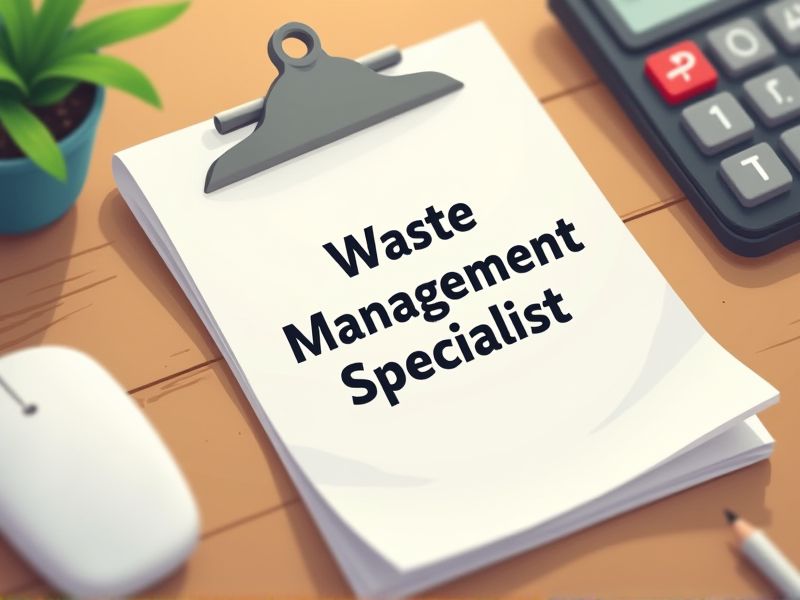
Waste Management Specialists handle hazardous materials and ensure compliance with environmental regulations, so specific certifications are essential to verify their capability in managing these risks. Regulatory agencies require certain certifications to maintain high standards of environmental safety and public health. These credentials also enhance a specialist's career prospects by demonstrating proficiency in current waste management practices. Essential certifications for Waste Management Specialists include those related to hazardous waste operations, environmental compliance, and safety management.
Certified Hazardous Materials Manager (CHMM)
The presence of a Certified Hazardous Materials Manager (CHMM) ensures compliance with regulatory standards in waste management operations. CHMM certification demonstrates a professional's expertise in safely handling and disposing of hazardous materials, reducing potential environmental risks. Waste management specialists benefit from CHMM knowledge by improving operational efficiency and mitigating liability issues related to hazardous waste. A CHMM skilled in emergency response strategies enhances safety protocols and worker protection in waste management facilities.
Certified Environmental Specialist (CES)
A Certified Environmental Specialist (CES) provides in-depth knowledge and understanding of environmental regulations, essential for ensuring waste management practices comply with legal standards. Their expertise aids in the development of sustainable waste management strategies, reducing environmental impact. CES credentials ensure that waste management specialists possess skills to identify and mitigate potential environmental hazards effectively. Having a CES on a waste management team increases trust and credibility with stakeholders by demonstrating a commitment to environmental responsibility.
Hazardous Waste Operations and Emergency Response (HAZWOPER)
Hazardous Waste Operations and Emergency Response (HAZWOPER) is necessary for Waste Management Specialists to ensure they handle and dispose of hazardous materials safely, reducing risks of contamination. It mandates specific training protocols that help prevent accidents and improve response effectiveness during potential hazardous material incidents. Compliance with HAZWOPER standards also aligns with environmental regulations, minimizing legal liabilities for waste management organizations. Thorough understanding of HAZWOPER enhances the ability to protect public health and the environment from the adverse effects of hazardous waste.
OSHA 30-Hour General Industry Safety Certification
Waste Management Specialists face numerous hazards, such as exposure to toxic materials and heavy machinery, which the OSHA 30-Hour General Industry Safety Certification addresses by providing comprehensive safety training. This certification ensures specialists are equipped with knowledge to reduce accidents and enhance workplace safety. Compliance with OSHA standards lowers the risk of legal penalties while fostering a culture of safety. Having certified specialists can improve operational efficiency and reduce costs associated with work-related incidents.
Solid Waste Management Certification
Solid Waste Management Certification is necessary because it ensures specialists are equipped with the latest industry standards and practices. This certification validates their expertise, fostering trust among clients and stakeholders. Improved skills reduce environmental risks and promote sustainable practices in waste handling. Regulatory compliance is enhanced, minimizing legal liabilities and promoting operational efficiency.
Environmental Management Systems (EMS) Lead Auditor Certification
Obtaining an EMS Lead Auditor Certification enables a waste management specialist to systematically evaluate and enhance environmental performance. The certification ensures that the specialist possesses adequate knowledge to identify and mitigate environmental risks. Regulatory compliance is facilitated, reducing potential legal and financial liabilities for organizations. Certified individuals can effectively lead audits, promoting sustainable waste management practices and fostering stakeholder trust.
Certified Professional in EHS (Environmental Health and Safety)
Certified Professionals in EHS possess specialized knowledge critical for identifying and mitigating environmental risks associated with waste management, ensuring compliance with regulations. They help organizations avoid costly fines and legal issues by implementing effective safety protocols and environmental strategies. Their expertise contributes to reducing workplace accidents and health hazards, improving overall employee safety in waste management operations. An EHS certification demonstrates a commitment to sustainability, which can enhance a company's reputation and foster community trust.
Construction Waste Management Certification
Construction Waste Management Certification sharpens a specialist's ability to efficiently reduce and recycle waste, directly impacting project sustainability and reducing environmental harm. Certification ensures professionals are versed in current regulations, minimizing the risk of legal non-compliance and associated penalties. It enhances operational effectiveness, leading to cost savings by optimizing waste disposal and management processes. Possessing certification can improve job prospects and credibility, as it demonstrates a specialist's commitment to industry best practices and continuous learning.
Recycling Management Certification
Recycling Management Certification equips Waste Management Specialists with advanced strategies to enhance recycling efficiency, directly impacting waste reduction. Its rigorous training module ensures specialists are updated with current technologies and regulations, leading to better compliance and reduced legal risks. The certification fosters a deeper understanding of complex sorting, processing, and market dynamics, enabling specialists to implement more effective recycling programs. As recycling becomes more critical globally, certified specialists contribute to sustainable practices, aligning with environmental goals and community expectations.
LEED Green Associate Certification
Pursuing the LEED Green Associate Certification equips waste management specialists with essential knowledge of sustainable practices, aiding them in implementing eco-friendly waste solutions. This certification enhances credibility, showcasing expertise in reducing environmental impacts associated with waste management. Understanding LEED principles allows specialists to effectively contribute to projects aiming for LEED certification, aligning waste management strategies with green building goals. Certified professionals often have improved career prospects, as organizations increasingly value sustainable waste management expertise.
Summary
With certifications, you can expect increased job opportunities in the waste management field. Certified specialists often command higher salaries due to proven expertise and skills. Certification can enhance your professional credibility, leading to greater trust from employers and clients. Employers may prefer certified candidates, which could give you a competitive edge in a crowded job market.
